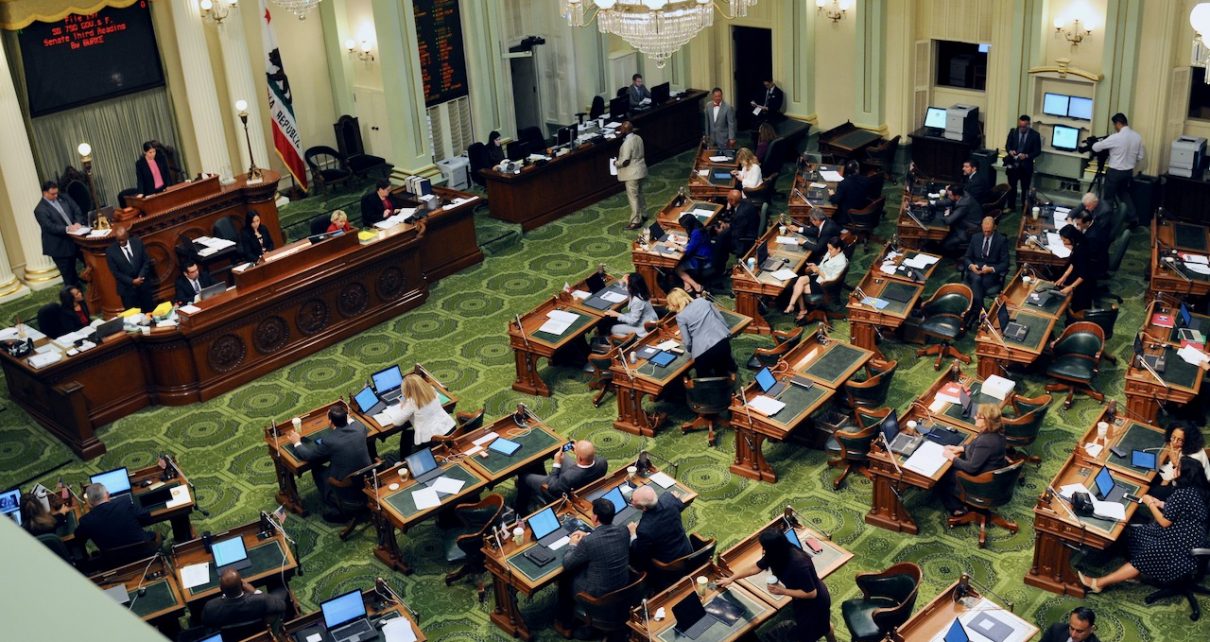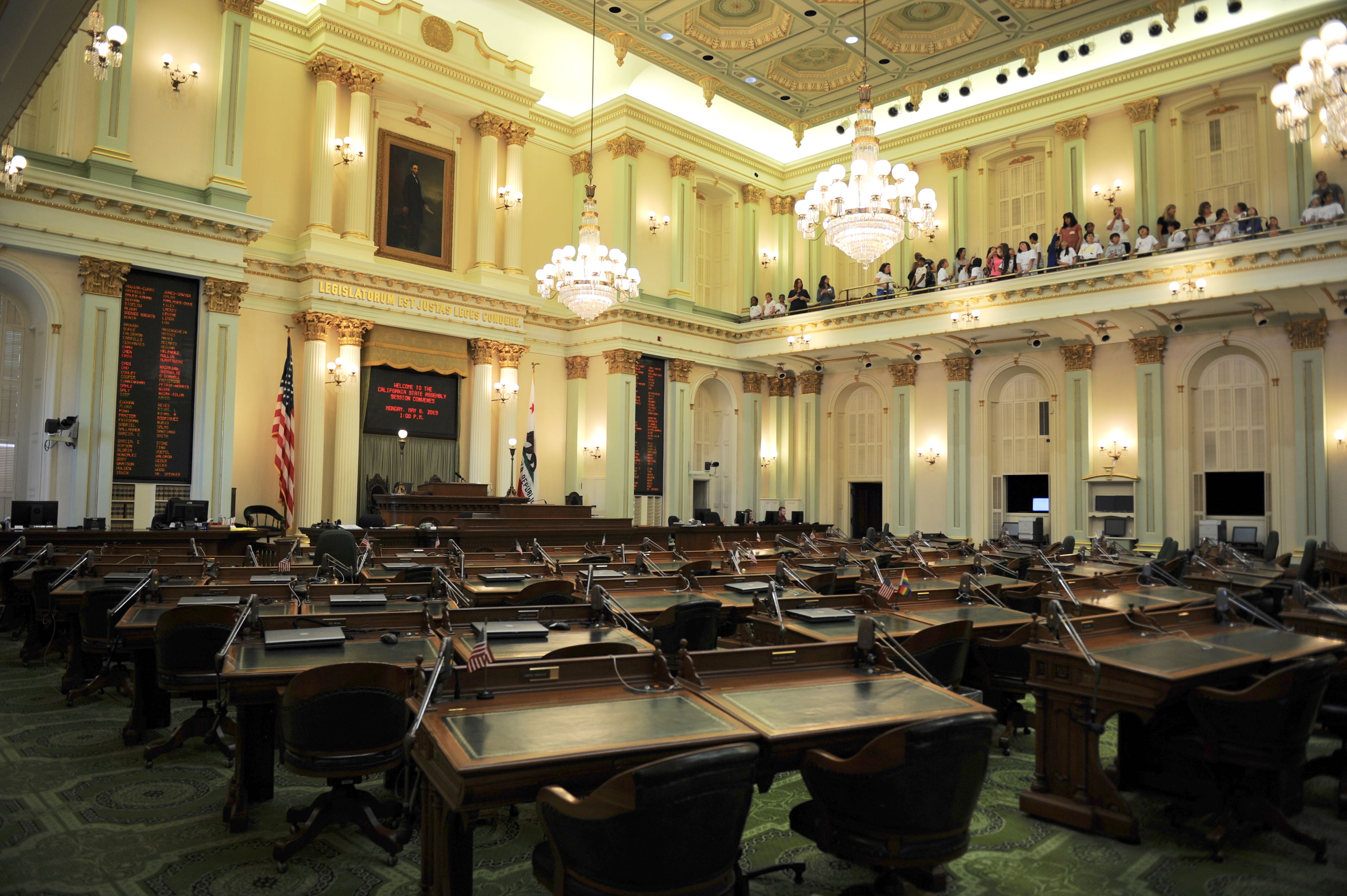
California State Assembly Chamber. (Photo: Kevin Sanders for California Globe)
The California Digital Infrastructure Act
The public interest is best served when sufficient funds are appropriated to the Public Utilities Commission
By Chris Micheli, June 30, 2022 6:13 pm
California has a number of formal acts in statute. Public Utilities Code Division 2.5 provides The Digital Infrastructure and Video Competition Act of 2006, which is contained in Section 5800 to 5970. Division 2.5 was added in 2006 by Chapter 700. Section 5800 names the Act.
Section 5810 provides numerous legislative findings and declarations including that increasing competition for video and broadband services is a matter of statewide concern for four main reasons. Moreover, legislation to develop this new process should adhere to specified principles.
In addition, the public interest is best served when sufficient funds are appropriated to the Public Utilities Commission (PUC) to provide adequate staff and resources to appropriately and timely process applications of video service providers and to ensure full compliance with the requirements of this division.
Finally, it is the intent of the Legislature that a video service provider must pay as rent a franchise fee to the local entity in whose jurisdiction service is being provided for the continued use of streets, public facilities, and other rights-of-way of the local entity in order to provide service. It is the intent of the Legislature that collective bargaining agreements be respected. And, it is the intent of the Legislature that the definition of gross revenues in this division must result in local entities maintaining their existing level of revenue from franchise fees.
Section 5820 provides that nothing in this division is deemed to create a vested right in a state-issued franchise by the franchise holder or its affiliates that would preclude the state from amending the provisions that establish the terms and conditions of a franchise. And, the holder of a state franchise is not deemed a public utility as a result of providing video service under this division.
Section 5830 provides definitions for the following terms: “broadband”; “cable operator”; “cable service”; “cable system”; “commission”; “franchise”; “franchise fee”; “holder”; “holder of a state franchise”; “incumbent cable operator”; “local entity”; “local franchising entity”; “network”; “open-video system”; “OVS operator”; “public rights-of-way”; “state franchise”; “subscriber”; “video programming”; “video service”; and, “video service provider.”
Section 5840 provides that the PUC is the sole franchising authority for a state franchise to provide video service under this division. The application for a state franchise must be made on a form prescribed by the PUC and must include specified information. The state franchise issued by the PUC must contain specified information. It is unlawful to provide video service without a state or locally issued franchise. There is a state franchise fee payable as rent or a toll for the use of the public rights-of-way by holders of the state franchise issued pursuant to this division. The state franchise fee must apply equally to all video service providers in the local entity’s jurisdiction.
Section 5850 provides that a state-issued franchise is only valid for 10 years after the date of issuance, and the holder must apply for a renewal of the state franchise for an additional 10-year period if it wishes to continue to provide video services in the area covered by the franchise after the expiration of the franchise.
Section 5860 provides that the holder of a state franchise that offers video service within the jurisdiction of the local entity must calculate and remit to the local entity a state franchise fee. The state franchise fee is a percentage of the holder’s gross revenues. No local entity or any other political subdivision of this state may demand any additional fees or charges or other remuneration of any kind from the holder of a state franchise based solely on its status as a provider of video or cable services other than as set forth in this division and may not demand the use of any other calculation method or definition of gross revenues.
In addition, the term “gross revenues” is defined and does not include specified items. Not more than once annually, a local entity may examine the business records of a holder of a state franchise to the extent reasonably necessary to ensure compensation in accordance with this section.
Section 5870 requires the holder of a state franchise to designate a sufficient amount of capacity on its network to allow the provision of the same number of public, educational, and governmental access (PEG) channels, as are activated and provided by the incumbent cable operator that has simultaneously activated and provided the greatest number of PEG channels within the local entity under the terms of any franchise in effect in the local entity as of January 1, 2007.
In addition, the PEG channels are for the exclusive use of the local entity or its designee to provide public, educational, and governmental channels. The PEG channels can be used only for noncommercial purposes. The local entity is required to ensure that all transmissions, content, or programming to be transmitted by a holder of a state franchise are provided or submitted in a manner or form that is compatible with the holder’s network, if the local entity produces or maintains the PEG programming in that manner or form.
Finally, a local entity may, by ordinance, establish a fee to support PEG channel facilities consistent with federal law that would become effective subsequent to the expiration of any fee imposed. The fee cannot exceed 1 percent of the holder’s gross revenues.
Section 5880 requires holders of state franchises to comply with the Emergency Alert System requirements of the Federal Communications Commission in order that emergency messages may be distributed over the holder’s network.
Section 5885 requires the local entity to allow the holder of a state franchise under this division to install, construct, and maintain a network within public rights-of-way under the same time, place, and manner as the provisions governing telephone corporations under applicable state and federal law. The term “encroachment permit” is defined.
Section 5890 provides that a cable operator or video service provider that has been granted a state franchise under this division may not discriminate against or deny access to service to any group of potential residential subscribers because of the income of the residents in the local area in which the group resides.
Section 5895 requires the PUC to collect granular data on the actual locations served by the holder of a state franchise.
Section 5900 requires the holder of a state franchise to comply with specified sections of the Government Code, and any other customer service standards pertaining to the provision of video service established by federal law or regulation or adopted by subsequent enactment of the Legislature. All customer service and consumer protection standards under this section must be interpreted and applied to accommodate newer or different technologies while meeting or exceeding the goals of the standards.
Section 5910 requires the holder of a state franchise to perform background checks of applicants for employment, according to current business practices.
Section 5920 requires a holder of a state franchise employing more than 750 total employees in California to annually report to the PUC specified information.
Section 5930 provides that any video service provider that currently holds a franchise with a local franchising entity in a county that is a party, either alone or in conjunction with any other local franchising entity located in that county, to a stipulation and consent judgment executed by the parties thereto and approved by a federal district court must neither be entitled to seek a state franchise in any area of that county, including any unincorporated area and any incorporated city of that county, nor abrogate any existing franchise before July 1, 2014.
Section 5940 provides that the holder of a state franchise under this division who also provides stand-alone, residential, primary line, basic telephone service cannot increase this rate to finance the cost of deploying a network to provide video service.
Section 5950 prohibits the PUC from permitting a telephone corporation that is providing video service directly or through its affiliates pursuant to a state-issued franchise as an incumbent local exchange carrier to increase rates for residential, primary line, basic telephone service above the rate as of July 1, 2006, until January 1, 2009, unless that telephone corporation is regulated under rate of return regulation.
Section 5970 provides that a state franchise may be transferred to any successor in interest of the holder to which the certificate originally is granted, whether this transfer is by merger, sale, assignment, bankruptcy, restructuring, or any other type of transaction, provided that specified conditions are met.
- Exemptions from Tax Withholding in California - July 23, 2024
- General Provisions of California’s Evidence Code - July 22, 2024
- Judicial Notice Under the California Evidence Code - July 21, 2024





6 thoughts on “The California Digital Infrastructure Act”